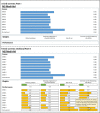Patient decision aid based on multi-criteria decision analysis for disease-modifying drugs for multiple sclerosis: prototype development
- PMID: 33836742
- PMCID: PMC8033667
- DOI: 10.1186/s12911-021-01479-w
Patient decision aid based on multi-criteria decision analysis for disease-modifying drugs for multiple sclerosis: prototype development
Abstract
Background: Since decision making about treatment with disease-modifying drugs (DMDs) for multiple sclerosis (MS) is preference sensitive, shared decision making between patient and healthcare professional should take place. Patient decision aids could support this shared decision making process by providing information about the disease and the treatment options, to elicit the patient's preference and to support patients and healthcare professionals in discussing these preferences and matching them with a treatment. Therefore, a prototype of a patient decision aid for MS patients in the Netherlands-based on the principles of multi-criteria decision analysis (MCDA) -was developed, following the recommendations of the International Patient Decision Aid Standards. MCDA was chosen as it might reduce cognitive burden of considering treatment options and matching patient preferences with the treatment options.
Results: After determining the scope to include DMDs labelled for relapsing-remitting MS and clinically isolated syndrome, users' informational needs were assessed using focus groups (N = 19 patients) and best-worst scaling surveys with patients (N = 185), neurologists and nurses (N = 60) to determine which information about DMDs should be included in the patient decision aid. Next, an online format and computer-based delivery of the patient decision aid was chosen to enable embedding of MCDA. A literature review was conducting to collect evidence on the effectiveness and burden of use of the DMDs. A prototype was developed next, and alpha testing to evaluate its comprehensibility and usability with in total thirteen patients and four healthcare professionals identified several issues regarding content and framing, methods for weighting importance of criteria in the MCDA structure, and the presentation of the conclusions of the patient decision aid ranking the treatment options according to the patient's preferences. Adaptations were made accordingly, but verification of the rankings provided, validation of the patient decision aid, evaluation of the feasibility of implementation and assessing its value for supporting shared decision making should be addressed in further development of the patient decision aid.
Conclusion: This paper aimed to provide more transparency regarding the developmental process of an MCDA-based patient decision aid for treatment decisions for MS and the challenges faced during this process. Issues identified in the prototype were resolved as much as possible, though some issues remain. Further development is needed to overcome these issues before beta pilot testing with patients and healthcare professionals at the point of clinical decision-making can take place to ultimately enable making conclusions about the value of the MCDA-based patient decision aid for MS patients, healthcare professionals and the quality of care.
Keywords: Alpha testing; Disease-modifying drugs; Multiple sclerosis; Patient decision aid; Prototype development; Shared decision making.
Conflict of interest statement
PJ received honoraria from Bayer Netherlands for consultancy activities and he is chairman of the MSmonitor foundation. EH received honoraria for consultancy activities and lectures from Teva, Biogen, Novartis, Schering and Sanofi Genzym. WV received honoraria for lectures from Biogen and Merck Serono, reimbursement for hospitality from Biogen, Teva, Sanofi Genzyme and Merck Serono, and honoraria for advisory boards from Merck Serono. IK, MH, SE have received funding from Bayer through institution.
Figures


References
-
- Burden of illness of multiple sclerosis Part II: Quality of life The Canadian Burden of Illness Study Group. Can J Neurol Sci. 1998;25(1):31–8. - PubMed
-
- Riazi A, Hobart JC, Lamping DL, Fitzpatrick R, Freeman JA, Jenkinson C, et al. Using the SF-36 measure to compare the health impact of multiple sclerosis and Parkinson's disease with normal population health profiles. J Neurol Neurosurg Psychiatry. 2003;74(6):710–4. doi: 10.1136/jnnp.74.6.710. - DOI - PMC - PubMed
Publication types
MeSH terms
Substances
LinkOut - more resources
Full Text Sources
Other Literature Sources
Medical

